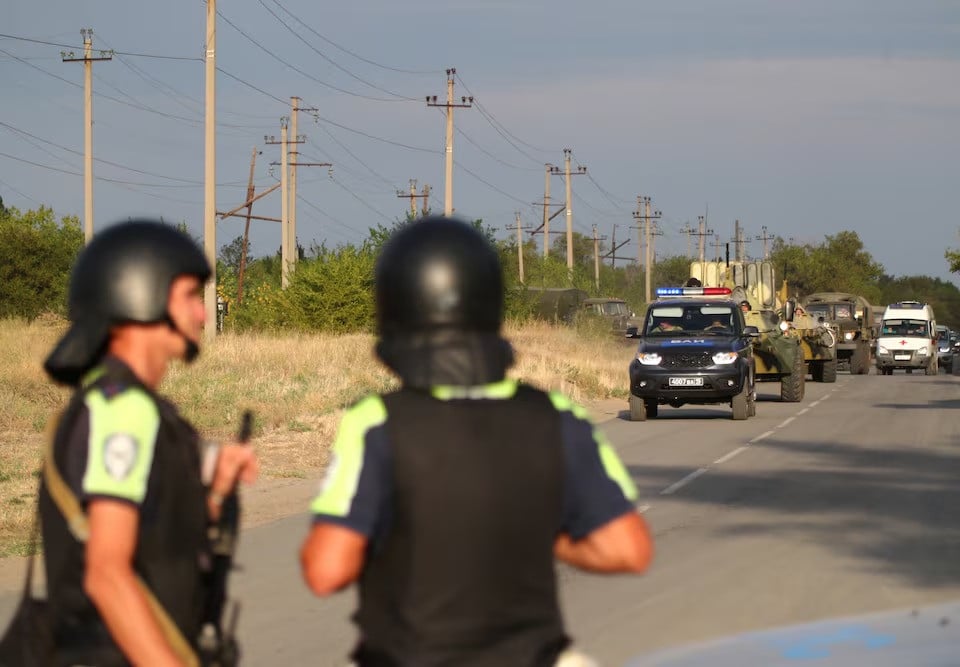Officials report that a total of eight prison employees and four inmates were taken hostage.
Russian Security Forces Neutralize Hostage-Taking Inmates in Volgograd: A Stark Reminder of Rising Militant Threats
Russia’s security services confronted a deadly hostage situation at a penal colony in the Volgograd region on Friday, where four inmates, claiming allegiance to Da’ish (ISIS), brutally murdered four prison staff members before being shot dead by Russian National Guard snipers. This incident has heightened concerns about the increasing frequency of militant attacks within the country, especially as its defense and security agencies remain heavily engaged in the ongoing conflict in Ukraine.
The hostage crisis unfolded with chilling violence. According to reports, the inmates had taken a total of eight prison employees and four fellow inmates hostage. The situation escalated rapidly when the attackers began posting videos online, portraying themselves as “mujahideen” of Da’ish. In these videos, the victims were shown in horrifying conditions, with one prison staff member lying in a pool of blood, his throat viciously slashed. The prisoners, armed with knives, hammers, and an improvised explosive vest, were seen pacing around the prison yard, with one of the hostages visibly slumped, his face covered in blood.
The swift and deadly response by Russian security forces followed a direct order from President Vladimir Putin. During a weekly Security Council meeting, Putin demanded immediate updates from the interior minister, the FSB security chief, and the head of the National Guard regarding the situation. The National Guard’s special forces in the Volgograd region acted decisively, with snipers executing four precise shots to neutralize the inmates, thus ending the standoff. The state news agency RIA quoted the National Guard as stating, “Snipers of the special forces of the Russian National Guard in the Volgograd region, with four precise shots, neutralized four prisoners who had taken prison employees hostage. The hostages have been released.”
The federal prisons service confirmed that all four attackers had been “liquidated,” but the operation came at a significant cost. Four prison staff members succumbed to fatal stab wounds inflicted by the attackers, while others received medical treatment in nearby hospitals. The swift but tragic conclusion of the hostage situation has left many questioning how such a grave incident could have occurred in the first place.

In one of the videos posted by the attackers, a prisoner could be heard shouting that they were acting in response to Russia’s alleged oppression of Muslims, declaring that they had acted “without mercy.” The attackers, identified as citizens of Tajikistan and Uzbekistan, were reportedly serving sentences for various crimes, including drug-related offenses and murder. Their exact demands remained unclear, but their actions and rhetoric suggested that their motives were deeply rooted in religious and political grievances.
This incident is not an isolated one. Russia has been experiencing a disturbing rise in militant activities in recent months, particularly in regions with significant Muslim populations. In June, just two months prior to the Volgograd incident, a violent prison uprising linked to Da’ish occurred in the southern region of Rostov. During that revolt, special forces were compelled to shoot dead six inmates who had taken hostages. The uprising was marked by extreme violence, further underscoring the growing threat of militant extremism within Russia’s prison system.
The June uprising was followed by a series of coordinated attacks in Dagestan, a predominantly Muslim region in southern Russia. These attacks targeted a church, a synagogue, and a police checkpoint, resulting in the deaths of at least 20 people. The perpetrators were linked to Da’ish, signaling a broader and more organized militant presence in the region.
In March, Da’ish claimed responsibility for one of the deadliest attacks in recent Russian history. Gunmen stormed the Crocus City concert hall near Moscow, indiscriminately spraying the audience with automatic weapons fire before setting the building ablaze. The attack claimed the lives of over 140 people and left a nation reeling in shock and grief.
The Volgograd incident has raised serious security concerns, particularly in light of the earlier June prison revolt. Questions have emerged about how the inmates managed to acquire weapons, including knives and hammers, as well as mobile phones to film and broadcast their violent acts. The ease with which they carried out the attack, coupled with their ability to post multiple videos online, has highlighted potential lapses in prison security and surveillance.
As Russia grapples with these escalating threats, the incident in Volgograd serves as a stark reminder of the challenges the country faces in maintaining security amid growing militant activity. The nation’s focus on its military campaign in Ukraine has left some of its internal security vulnerabilities exposed, creating opportunities for extremists to exploit.

